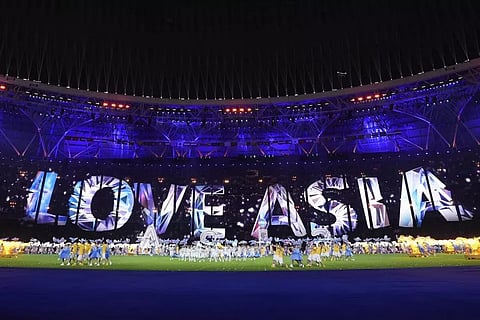

HANGZHOU: As the curtain fell on the six-day 4th Asian Para Games on Saturday, the continental sports gala bid adieu to the participants and everyone involved with a poetic party, filled with Chinese culture, music, and, above all, love, according to the creative team of the Para Games’ closing ceremony.
The ceremony was a show of China’s love for its friends and Asian camaraderie, said Sha Xiaolan, chief director of the closing ceremony, at a media briefing on Friday.
“We drew on the finest traditional Chinese rites and rituals in seeing off our beloved friends,” revealed Sha, who was also the chief director for the opening ceremony. One of the traditions was presenting poems as gifts when friends parted ways.
In ancient China, it was customary to write poetry for friends departing on a journey, especially among poets and literary figures, to show their affection, longing, and melancholy, among a slew of other emotions.
The costumes and choreography for the closing ceremony had been designed and created in such a way as to showcase the beauty and imagery of Chinese poetry, according to Sha. In one scene, the performers collectively recited lines from the verse Bie Li, or “Parting,” by renowned Tang Dynasty (618-907) poet Lu Guimeng.
“It was full of Chinese-style romance,” said Lyu Yuan, chief writer for both the closing and opening ceremonies.
Serving tea to guests was a time-honored Chinese tradition, explained Lyu, and more than 3,000 years ago, tea had already become a token of friendship and an item of tribute.
Both the West Lake Longjing tea production and the Jingshan tea ceremony—elements of China’s traditional tea-processing techniques and associated social practices that are inscribed on UNESCO’s Representative List of the Intangible Cultural Heritage of Humanity—originated in Hangzhou, the host city of the Asian Para Games.
“Through artistic renderings of Chinese tea culture, we hoped to take the purest water and brew the best tea for our finest friends,” said Sha.
Throughout the Para Games, a philosophy of inclusion had always been at the forefront, and that continued to be the case during the closing ceremony, with a total of 213 people with impairments taking center stage during the artistic performances.
“They had put in more effort than able-bodied performers and brought us many surprises,” Sha said. “We had witnessed their high self-confidence and energy.” Unlike the opening ceremony, no advanced technology aided the extinguishing of the main cauldron.
Instead, as the flame dimmed, a community service worker who narrated films for the visually impaired described the process to a group of children with visual impairment, while they sat on the stairs around the main cauldron. “This was unprecedented,” said Sha.
“More importantly, we hoped that everyone could equally share and soak up the glory and love as the flame was being extinguished,” he concluded.
Indian para athletes created history on Saturday as they ended their Hangzhou Asian Para Games campaign with an unprecedented 111 medals, the biggest haul for the country in any major international multi-sport event.
With 29 gold, 31 silver and 51 bronze in their kitty, the Indian para athletes won four medals more than the record tally of 107 won by the able-bodied athletes in the Hangzhou Asian Games held from September 23 to October 8.
India ended at fifth place in the medals tally, a remarkable achievement in itself, below China (521 medals: 214 gold, 167 silver, 140 bronze), Iran (44 gold, 46 silver, 41 bronze), Japan (42, 49, 59) and Korea (30, 33, 40).
The first Para Asian Games was held in 2010 in Guangzhou, China, where India had finished 15th with 14 medals, including one gold.
In the 2014 and 2018 editions, India had finished 15th and ninth respectively.
The only instance India had crossed the 100-medal mark in a major international multi-sport event previously before the recent Asiad success (Olympics, Asian Games and Commonwealth Games) was the 101 won during the 2010 Delhi Commonwealth Games.
“We have made history, our para athletes have done the country proud. We will win more medals in the Paris Paralympics than in Tokyo,” Paralympic Committee of India president Deepa Malik told media.
“However, it is not a surprise for us. We had expected between 110 to 115 medals and we ended at 111, the auspicious number (Angel Number),” she added.